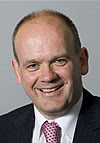This morning the transport committee took evidence from
TfL for our investigation into the exciting future of ticketing on public transport. First, though, we had to approve the chair's actions taken over the summer break.
Olympic Test EventFollowing the cycle race that took place in South West London and Surrey a couple of weeks ago, the committee chair, Caroline
Pidgeon, had written to
TfL expressing the concerns of local residents. Having been caught up in traffic around
Putney and Richmond, I shared her concerns, as did my colleague Dick Tracey, who represents Merton &
Wandsworth.
First, we felt that the road closures had been left in place for too long after the event was over. More than an hour after the last cyclists had passed,
Putney was still gridlocked, with key roads closed to traffic.
Second, the route
marshalls were unhelpful to the public, often because they were not being informed of the latest situation. Many of them came from outside the area and had little local knowledge which meant that they could not give adequate directions to drivers seeking an escape from the chaos.
Clearly this test event highlighted some serious problems which need to be ironed out before 2012. Just as well it wasn't the real thing...
Tickets To RideTfL's fares experts,
Shashi Verma and Will Judge were present to explain developments in the ticketing strategy. Both have appeared before committees in the past so they gave a polished and informative performance - sometimes clashing with representatives of consumer group 'Which' and the
ITSO national ticketing organisation.
The key initiative was the introduction of 'Wave and Pay' more properly known as
Contactless Payment Cards. With the
Oystercard PFI contract due to expire in 2015,
TfL had been examining future options.
Banks are increasingly issuing
contactless payment cards. These require no pin number for purchases under £15 and can already be used to buy coffee and newspapers.
Pret A Manger,
McDonalds and Boots are signed up to the scheme and
Tesco is planning to offer the service, but the introduction of wave and pay for public transport would encourage a step change in the use of the almost 20 million cards that will be in circulation by Christmas.
In effect using bank cards as Oyster cards would be much easier for the passenger, eliminating the need to apply for a card or to top it up. It would also save
TfL money, for 14% of the cost of a ticket is spent issuing and monitoring it. Between 2 and 9 percent of the cost of a ticket is paid as commission where tickets are purchased from high street retailers.
The project was set to cost £75 million but will realise savings of between £15 and £20 million per year, so the business case is sound.
But What About Passengers?Whilst many people now have
contactless payment cards, the facility has not been widely publicised. 'Which' had surveyed passengers and found some resistance to this new payment method, with concerns expressed about the lack of control and the possibility of going overdrawn. Providing a statement of journeys made and costs incurred on a daily basis - and a facility to challenge them - would go some way to dealing with these worries.
The purchase limit of £15 per transaction - and £45 per day - would limit potential exposure, particularly if the card was stolen. It also meant that payment for longer journeys outside London would be impractical.
Far from complicating an already challenging fares structure,
TfL believed that wave and pay would simplify fares and provide
transparency.
Shashi Verma pointed out the reduction of the number of ticket types from over 270 a few years ago to just 45 - still complex but nowhere near as byzantine as in the past.
Concessionary fares for old people, children etc, would remain but would not be included in the project - because no payment is required and the ticket is used as a proof of identity and entitlement in those cases.
And they assured us that all stations would be staffed even if there were changes to the ticket halls.
Phase 1 of the project, going live in March 2012, will see Wave and Pay go live for single bus journeys within London. It will then be progressively rolled out to cover other ticket types and modes of travel.
Work ProgrammeThe transport committee work programme in the run up to the 2012 elections was agreed. In our coming meetings we plan to investigate
Crossrail, major rail and tube projects, Olympics transport, river services and the effectiveness of London councils' local implementation plans.
An exciting year lies ahead!









